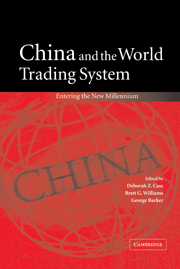Book contents
- Frontmatter
- Contents
- List of figures
- List of tables
- List of contributors
- Preface
- Acknowledgements
- Abbreviations and acronyms
- Introduction: China and the reshaping of the World Trade Organization
- PART I The world trading system
- 1 The impact of China's accession on the WTO
- 2 WTO membership for China: to be and not to be – is that the answer?
- 3 China and the ‘constitutionalization’ of international trade law
- PART II The accession
- PART III China – the domestic sphere
- PART IV Trade in goods
- PART V Trade in services and competition policy
- PART VI Intellectual property
- PART VII Dispute settlement
- Select bibliography
- Index
3 - China and the ‘constitutionalization’ of international trade law
Published online by Cambridge University Press: 28 July 2009
- Frontmatter
- Contents
- List of figures
- List of tables
- List of contributors
- Preface
- Acknowledgements
- Abbreviations and acronyms
- Introduction: China and the reshaping of the World Trade Organization
- PART I The world trading system
- 1 The impact of China's accession on the WTO
- 2 WTO membership for China: to be and not to be – is that the answer?
- 3 China and the ‘constitutionalization’ of international trade law
- PART II The accession
- PART III China – the domestic sphere
- PART IV Trade in goods
- PART V Trade in services and competition policy
- PART VI Intellectual property
- PART VII Dispute settlement
- Select bibliography
- Index
Summary
Introduction
I am told that the Chinese language character for crisis is the same, or similar to, the character for opportunity. This chapter suggests that China's entry to the WTO may have similarly ambiguous consequences in relation to what has been called the ‘constitutionalization’ of the international trading system. I focus on two aspects of the phenomenon, namely China's influence upon the trade constitutionalization process and its influence upon China.
I argue, first, that the constitutionalization of international trade law will be largely strengthened by China's accession. Secondly, from China's point of view, constitutionalization has the potential to affect China negatively, as well as creating favourable conditions for change. In short, both crisis and opportunity characterize the relationship between China and the constitutionalization of international trade law.
But first, what is constitutionalization? The term has been bandied about for a number of years, and in a variety of international contexts: Europe as a constitutional structure, the UN Charter as a blueprint for world order, and now the World Trade Organization agreements as some kind of incipient constitution for the legal regulation of international trade. This chapter adopts some of these various meanings in order to explore some implications of China's entry to the WTO.
The chapter is divided into two parts. In the first part I examine constitutionalization from the perspective of the international trade law system generally, namely what is likely to be the effect of China's entry to the WTO upon the constitutionalization process.
- Type
- Chapter
- Information
- China and the World Trading SystemEntering the New Millennium, pp. 40 - 52Publisher: Cambridge University PressPrint publication year: 2003
- 2
- Cited by

